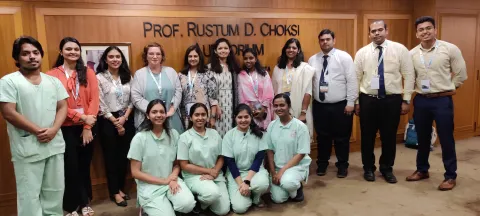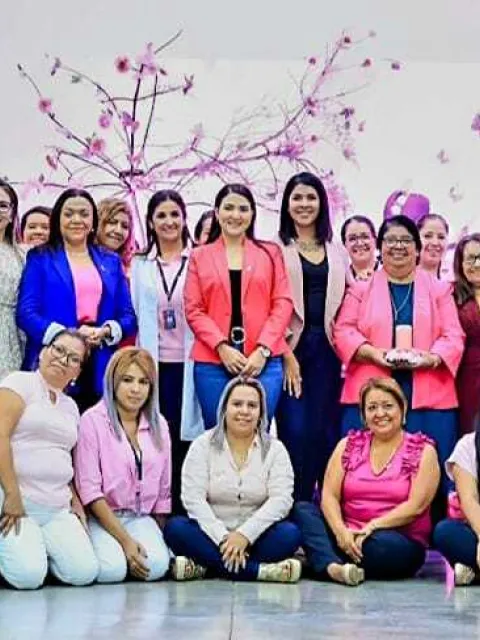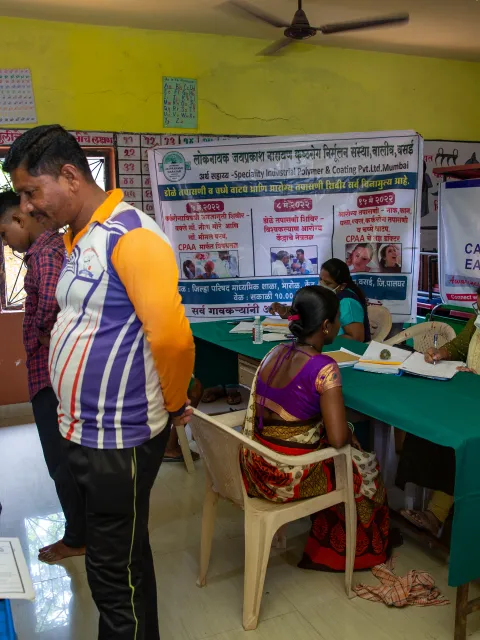UICC Technical Fellowship supports in speech rehabilitation and people-centred survivorship care in Mumbai
Through a UICC Technical Fellowship, Mr Arun Balaji of Tata Memorial Hospital trained under Dr Heather Starmer at Stanford Medicine Cancer Center, advancing speech and swallowing rehabilitation for head and neck cancer patients in Mumbai.

Mr Arun Balaji (second from the right) and Dr Heather Starmer (fourth from the left) with the team at Tata Memorial Hospital.
HIGHLIGHTS
- Mr Arun Balaji of Tata Memorial Hospital was awarded a UICC Technical Fellowship to visit Stanford Medicine Cancer Center, focusing on head and neck cancer rehabilitation.
- His Fellowship visit, hosted by Dr Heather Starmer, has helped improve rehabilitation for head and neck lymphoedema in India’s oncology community.
- The techniques and skills learned through the Fellowship led to the introduction of EMST150 therapy in Mumbai, which already benefitted over 20 patients in the few months after his return.
- Plans are underway to develop and launch a Master’s degree curriculum in oncology rehabilitation and build a global network of speech therapy professionals.
As part of its July series celebrating member-driven stories, UICC shines a light on less visible aspects of cancer control beyond prevention and early detection. This article looks at the collaborative work between individuals working at two UICC member organisations, Tata Memorial Hospital in Mumbai and the Stanford Medicine Cancer Centerin California, forged and supported through UICC's Technical Fellowships.
Mr Arun Balaji, a speech language pathologist (SLP) at Tata Memorial, has worked in oncology rehabilitation since 2012. India has one of the highest global rates of oral and head and neck cancers, largely driven by tobacco and areca nut use. Many patients present in advanced stages, requiring aggressive surgery and (chemo)radiation.
“Rehabilitation becomes essential to restore speech and swallowing functions post-treatment, but in India, we still lack enough trained SLP professionals,” said Mr Balaji. “The complexity of cases is rising, but our capacity has not kept pace.”
This gap in capacity motivated Balaji to apply for a UICC Technical Fellowship in 2023. He spent four weeks at Stanford under the mentorship of Dr Heather Starmer, Director of the Head and Neck Cancer Speech and Swallowing Rehabilitation programme at the Stanford Medicine Cancer Center.
“My goal was to deepen my skills in managing head and neck lymphoedema, characterised by swelling, a feeling of tightness, and restricted movement, as a result of surgery or radiation,” said Mr Balaji. “This condition has a huge impact on patients’ quality of life, not only causing discomfort and visible swelling, but also often affecting swallowing, impairing speech, and undermines confidence and ease in social settings.”
At Stanford, Mr Balaji shadowed four SLPs in oncology, surgical and radiation clinics, and also visited paediatric and neuro-rehabilitation services. “The exposure was comprehensive,” he said. “It helped me understand protocols, workflows, and therapy tools that simply aren’t part of routine practice in India.”
One highlight was learning to apply EMST150, a device-driven dysphagia therapy used in the US for treating late radiation-induced swallowing difficulties. Back in Mumbai, Mr Balaji quickly put this knowledge into action. With institutional support, his team introduced EMST150 into regular care and has already used it with over 20 patients.
“Arun's training has raised the profile of rehabilitation within our department,” said Dr Sarbani Ghosh Laskar, Mr Balaji’s mentor at Tata Memorial. “We are now seeing growing interest from colleagues across disciplines.”
Since his return to India, in April 2024, with institutional support Balaji invited Starmer to India to co-lead a head and neck lymphedema course at the 3rd International Cancer Rehabilitation Conference at Tata Memorial. “Having Dr Starmer lead the course in person brought real depth to the programme,” he said. “It gave our team and attendees a rare chance to engage directly with one of the field’s most experienced professionals. The course helped build momentum around this emerging sub-speciality, and we’re hoping to sustain that through future collaborations.”
Dr Starmer, for her part, saw the exchange as mutually enriching, deepening her appreciation for adaptive problem-solving in resource-constrained environments. “Mentoring Arun reminded me of the universality of patient needs, regardless of setting,” she said. “He brought a deep clinical curiosity and commitment to equity that was inspiring. It was rewarding to see how techniques we often take for granted could be transformative elsewhere. It also made me think more intentionally about how we teach and share knowledge – not just what we do, but why and how it can be adapted.”
Expanding recognition and training in supportive care
The Fellowship also prompted reflection on the state of supportive care globally, with Mr Balaji and Dr Starmer both explaining how speech and swallowing rehabilitation remain under-recognised in oncology worldwide.
“There’s been progress, but rehabilitation still doesn’t receive the attention it deserves,” said Dr Starmer. “Too often, cancer care stops once treatment ends, with these rehabilitation therapies sidelined. But recovery of function and quality of life are key to survivorship and dignity – that’s what rehabilitation is about. And it should be part of the standard pathway. Fellowships such as UICC’s give clinicians the space to innovate and bring these essential services to more people.”
This shared conviction is fuelling new ambitions. Mr Balaji and his colleagues are now working to establish a Master’s degree programme in speech language pathology in oncology rehabilitation at Tata Memorial to formalise training for future SLPs. “We want to build a pipeline of professionals who are prepared to meet the demands of cancer care in India and even across neighbouring countries,” he said.
Further building on the connections developed with Dr Starmer, Mr Balaji has also begun collaborating with other UICC members working on speech and swallowing challenges. His aim is to create a growing network of professionals focused on this vital but often marginalised field – and to elevate its role within comprehensive cancer care.
For Mr Balaji, the journey has reinforced his belief in people-centred care. “When you work in rehabilitation, you realise that survivorship is not just about living longer – it’s about living well. The ability to speak, eat, and socialise is fundamental. That’s what we’re trying to protect.”
The collaboration exemplifies people-centred care in practice – extending beyond borders, disciplines and institutions. “We’ve only just begun,” said Balaji. “There is so much potential to grow.” He referred not only to the clinical advances being implemented at Tata Memorial but also to broader opportunities – from developing new education programmes and research collaborations to expanding awareness of speech and swallowing rehabilitation in cancer care across South Asia. “The conversations we’ve started, the skills we’ve brought back, the networks we’re building – they all point to something much bigger. We are planting seeds now that we hope will grow into lasting improvements in cancer care.”
Last update
Friday 11 July 2025
